Quadrilateral
A quadrilateral is a polygon that has four sides, four vertices, and four angles. The sum of the interior angles of a quadrilateral is always 360 degrees.
Types of Quadrilaterals
There are several types of quadrilaterals, including:
- Square: A quadrilateral with four equal sides and four right angles.
- Rectangle: A quadrilateral with four right angles, opposite sides are equal in length, and diagonals are of equal length.
- Parallelogram: A quadrilateral with opposite sides that are parallel and equal in length.
- Rhombus: A quadrilateral with all four sides of equal length.
- Trapezoid: A quadrilateral with exactly one pair of parallel sides.
Properties of Quadrilaterals
Quadrilaterals have various properties, including:
- The sum of the lengths of any two sides of a quadrilateral is greater than the lengths of the other two sides.
- Opposite angles in a quadrilateral are equal.
- The diagonals of some quadrilaterals bisect each other.
- Some quadrilaterals have perpendicular diagonals.
◂Math Worksheets and Study Guides Second Grade. Sequencing
Study Guide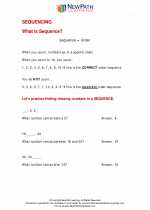 Sequencing
Sequencing  Worksheet/Answer key
Worksheet/Answer key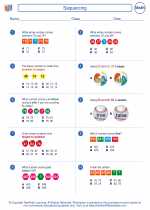 Sequencing
Sequencing  Worksheet/Answer key
Worksheet/Answer key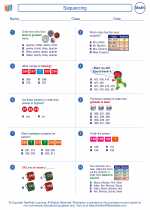 Sequencing
Sequencing  Worksheet/Answer key
Worksheet/Answer key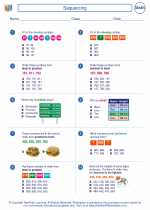 Sequencing
Sequencing  Vocabulary/Answer key
Vocabulary/Answer key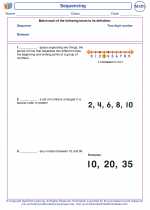 Sequencing
Sequencing 

 Worksheet/Answer key
Worksheet/Answer key
 Worksheet/Answer key
Worksheet/Answer key
 Worksheet/Answer key
Worksheet/Answer key
 Vocabulary/Answer key
Vocabulary/Answer key

The resources above cover the following skills:
Number and Operations (NCTM)
Understand numbers, ways of representing numbers, relationships among numbers, and number systems.
Count with understanding and recognize 'how many' in sets of objects.
Develop understanding of the relative position and magnitude of whole numbers and of ordinal and cardinal numbers and their connections.
Develop a sense of whole numbers and represent and use them in flexible ways, including relating, composing, and decomposing numbers.
Connect number words and numerals to the quantities they represent, using various physical models and representations.
Grade 2 Curriculum Focal Points (NCTM)
Number and Operations: Developing an understanding of the base-ten numeration system and place-value concepts
Children develop an understanding of the base-ten numeration system and place-value concepts (at least to 1000). Their understanding of base-ten numeration includes ideas of counting in units and multiples of hundreds, tens, and ones, as well as a grasp of number relationships, which they demonstrate in a variety of ways, including comparing and ordering numbers. They understand multi-digit numbers in terms of place value, recognizing that place-value notation is a shorthand for the sums of multiples of powers of 10 (e.g., 853 as 8 hundreds + 5 tens + 3 ones).
Connections to the Grade 2 Focal Points (NCTM)
Number and Operations: Children use place value and properties of operations to create equivalent representations of given numbers (such as 35 represented by 35 ones, 3 tens and 5 ones, or 2 tens and 15 ones) and to write, compare, and order multi-digit numbers. They use these ideas to compose and decompose multi-digit numbers. Children add and subtract to solve a variety of problems, including applications involving measurement, geometry, and data, as well as nonroutine problems. In preparation for grade 3, they solve problems involving multiplicative situations, developing initial understandings of multiplication as repeated addition.